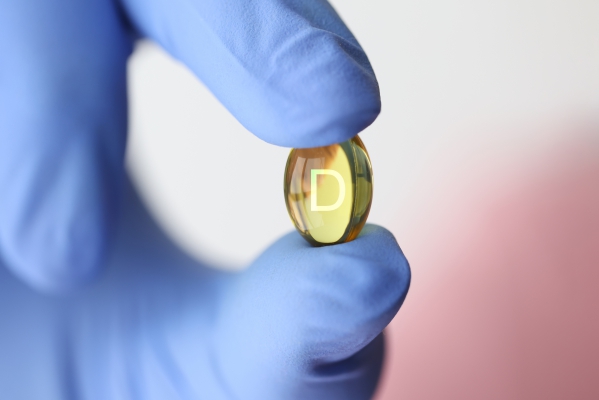Vitamin D3 has immense worth on health and should be consumed daily by everyone. Vitamin D3 is an important vitamin plays vital role especially in the growth and development of skeletal system. This vitamin can be synthesized within the body from sunlight but now a day sun exposure become so much risky due to the UV radiation, to resolve the risk supplementation of Vitamin D3 occurred and recently, a wide group of vitamin D3 supplementary products are becoming accessible on market and these provide the recommended quantity of Vitamin D3 without getting exposed to the sunlight.
Some information regarding Vitamin D3
- Vitamin D3 is a fat soluble vitamin found in animal
- During the biosynthesis of cholesterol, an intermediate product is formed named 7-dehydroxy cholesterol, which is converted into Vitamin D3 within the skin on exposure to sun light
- This vitamin is referred to as sun shine vitamin
- The synthesis of vitamin D3 in skin is extensively depends on the sun exposure, it is indicated that both of it has a proportional relationship
- The active form of vitamin D3 is known as calcitriol
- 7-dehydroxy cholesterol is hydroxylated twice in liver and kidney and form 1, 25 dihydroxycholecalciferol or calcitriol, the biologically active form of vitamin D3
- In this active form the vitamin servers its entire essential functions within the body
- It is one of the most essential nutrients that help to protect the body and increases the health of entire skeletal system

Chemistry
It is an imperative vitamin and is responsible to enhance the health of the bone, teeth, muscle and immune system of the body. Vitamin D is a fat soluble vitamin and requires fat for its absorption. It is beneficial to consume Vitamin D with fat as it makes the vitamin easily absorbable. The fat which should be consumed with Vitamin D must be unsaturated fatty acids that are obtained from plant source. As it is responsible for improving the level of blood cholesterol (by reducing LDL level and increasing HDL level), helps to stabilize the rhythm of the heart and cardiac health, maintains the proper fluidity of cell membrane and helps in cellular transport. Hence, consumption of Vitamin D along with healthy fat has found to enriching the nutritive value of Vitamin D by many folds.
Vitamin D is of two types which are Vitamin D2 and Vitamin D3. Vitamin D2 has found in Plants and Vitamin D3 has found in animals. The active form of Vitamin D2 is termed as ergocalciferol and it is produced from ergosterol which is known as provitamin of Vitamin D2. The provitamin of Vitamin D3 is termed as cholecalciferol. Vitamin D2 and D3 present in body are not in their active form they get metabolized and then converted into their active form, which are responsible for performing the respective biochemical functions within the body.


Who are the exact target group of consuming Vitamin D3 supplements or should obtain Vitamin D3 from natural source?
Vitamin D3 plays various important roles and has numerous biochemical functions within the body. It should be consumed by everyone for promoting the calcium level and enhancing the overall healthiness of skeletal system. Apart from this it can be consumed through supplements as this provides recommended dose of Vitamin D3 without getting exposed to sun.
Though some kind of people who are at risk are considered more important beneficiary for consuming it, who are –
- Women after menopause
- Middle aged men
- Middle aged women
- People suffering from arthritis
- People suffering from osteomalacia
- People suffering from osteoporosis
- People suffering from ricket
- People who has increased demand of vitamin D3, calcium and phosphorus (during pregnancy, lactation, adolescent period)
Needs of consuming Vitamin D3
The main causes of consuming Vitamin D3 are listed below –
- It has seen that every woman is prone to develop various bone problems after menopause due to bone loss and hence this is extremely beneficial for them
- Many men and women during their middle age of life experienced arthritis and various bone deformities due to lessening of calcium, phosphorus level and poor vitamin D3 status of the body, thus consuming it as per recommendation can be able to prevent these complications
- To obtain good health of bone and improving bone density, this is required as it increases the absorption of calcium and phosphorus that helps to prevent bone deformities and make the bones strengthen.
- This is required to enhance the growth and development of skeletal muscle and to optimize its performance and strength

Health benefits of Vitamin D3
Consumption of Vitamin D3 is associated with enhancing the overall health status of an individual. Its health benefits are broadly discussed in below -
Role on the growth and development of bones
- It helps to increases the calcium uptake by osteoblast (bone cell) and enhances the calcium deposition within bone
- It is associated with enhancing the mineralization of bone with adequate amount of calcium and phosphorus and stimulates the bone mineral density
- It helps to increase the mass and density of the bone and make the bone strengthen and more healthy
- Helps to prevent bone loss and it is coupled with reducing the risk of developing degenerative bone diseases
Role on calcium absorption
- It helps to increase the absorption of calcium by many folds
- It helps to stimulates the synthesis of calcium binding protein in intestine which is associated with increasing more calcium absorption from intestine
- It reduces the calcium excretion from kidney and increases the reabsorption of calcium along with phosphorus through renal tubule

Effect on regulating plasma calcium level
- Vitamin D3 present is responsible for mobilizing of bone calcium to maintain plasma calcium level. It works along with parathyroid hormone
- Decrease in plasma calcium level causes the secretion of parathyroid hormone.
- Parathyroid hormone along with vitamin D3 increases the bone calcium mobilization (release of calcium from bone to blood) that restores plasma calcium level. Apart from that they are found to be related with increasing intestinal calcium absorption and calcium reabsorption from kidney leads to restoring plasma calcium level
Role on preventing diseases
- It helps to prevent various degenerative diseases of bone which include osteoporosis, rheumatoid arthritis, osteomalacia, ricket, bone loss, depletion of calcium from bone, calcium loss and help to relief pain
- Helps to prevent hypoparathyroidism
Effect on skeletal muscle
- Various study have revealed that consumption of vitamin D3 as per recommended dietary allowance is related with increasing the skeletal muscle strength and functioning. Thus, it is coupled with enhancing the ability of physical activities
- Older people who are taking it properly are found to have comparatively lesser fall risk
- It helps to improve neuromuscular function

Effect on immune system
- Vitamin D3 is able to increase the secretion of immunoglobulin
- It helps to inhibit the proliferation of B-cell
- It helps to stimulate the function of macrophages, T-lymphocytes that helps to boost the immune system that can protect the body from external pathogens
One can easily obtained all of these health benefits by simply consuming this health worthy Vitamin.
Source:
Fleet, J.C., 2017. The role of vitamin D in the endocrinology controlling calcium homeostasis. Molecular and cellular endocrinology, 453, pp.36-45.
Goltzman, D., 2018. Functions of vitamin D in bone. Histochemistry and cell biology, 149(4), pp.305-312.
Hill, T.R. and Aspray, T.J., 2017. The role of vitamin D in maintaining bone health in older people. Therapeutic advances in musculoskeletal disease, 9(4), pp.89-95.
Holick, M.F., 2018. Photobiology of vitamin D. In vitamin D (pp. 45-55). Academic Press.
Lockau, L. and Atkinson, S.A., 2018. Vitamin D’s role in health and disease: How does the present inform our understanding of the past?. International journal of paleopathology, 23, pp.6-14.
Muscogiuri, G., 2018. Vitamin D: Past, present and future perspectives in the prevention of chronic diseases. European journal of clinical nutrition, 72(9), pp.1221-1225.
Skrobot, A., Demkow, U. and Wachowska, M., 2018. Immunomodulatory role of vitamin D: a review. In Current Trends in Immunity and Respiratory Infections (pp. 13-23). Springer, Cham.
Wang, H., Chen, W., Li, D., Yin, X., Zhang, X., Olsen, N. and Zheng, S.G., 2017. Vitamin D and chronic diseases. Aging and disease, 8(3), p.346.
Wilson, L.R., Tripkovic, L., Hart, K.H. and Lanham-New, S.A., 2017. Vitamin D deficiency as a public health issue: using vitamin D 2 or vitamin D 3 in future fortification strategies. Proceedings of the Nutrition Society, 76(3), pp.392-399.



